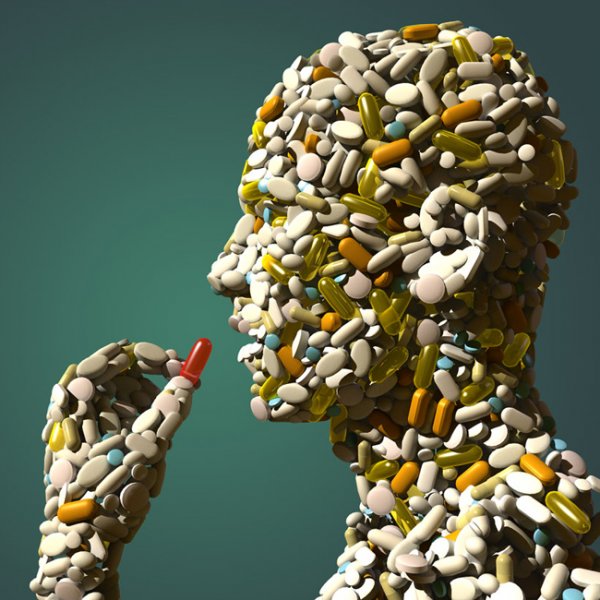
|
HiddenMysteries.com HiddenMysteries.net HiddenMysteries.org |
* * * * * * * * * * * * * * * * * * * * * * * * * * * * * * * * * * * * * * *
A word from our sponsor

Over-Prescribed
Friday, June 24 2011 @ 09:44 AM CDT
Increase font Decrease font
This option not available all articles
Taking Too Many Pills is Hurting Americans
 By Cory Franklin
By Cory Franklin
Aggressive marketing pushes drugs on patients well beyond clinical usefulness, and it's thinning their wallets and threatening their health.
"If all the drugs were thrown in the ocean, everyone would be better-off...except for the fish."
-Oliver Wendell Holmes
That maxim of 19th-century American physician and author Oliver Wendell Holmes is an overstatement today, but still contains a grain of wisdom. For generations of physicians, the prevailing teaching was not to prescribe too many drugs in order to avoid unwanted side-effects and drug interactions. No longer.

Even considering remarkable technological advances – organ transplants, robotic surgeries, lasers, electronic medical records – the greatest difference in American medicine since the 1970s is the increase in the number of medications prescribed to patients today. To treat chronic diseases and control symptoms, the average American takes about 12 medications annually, compared to seven, 20 years ago. Patients who once came into the office carrying their medications in a purse, or pocket, now need a shopping bag.
In the 1970s, spending on drugs totalled roughly 5% of total US healthcare costs. Today, that has doubled and is rising quickly. Admittedly, new drugs used to treat conditions once treated with surgery may actually bring down costs, since surgery is generally more expensive. Simply citing increases in spending on drugs and ignoring the offset in surgical costs gives a misleading picture of the overall costs of prescription medicines. Still, spending on prescription medications has increased by a staggering $200bn in two decades.
Why the exponential rise in drug prescription? There are a number of reasons, some legitimate, others not so. The average American is older, heavier, with more hypertension, high cholesterol, diabetes, osteoporosis and arthritis than a generation ago – all conditions effectively treated with medications.
 Direct marketing to patients is another trend toward increased prescriptions. After government restrictions on direct consumer advertising were relaxed, patients became more "proactive" in approaching their doctors for the latest treatments they have heard about: searching the internet or watching Super Bowl commercials, as the saying goes, "Ask your doctor about …"
Direct marketing to patients is another trend toward increased prescriptions. After government restrictions on direct consumer advertising were relaxed, patients became more "proactive" in approaching their doctors for the latest treatments they have heard about: searching the internet or watching Super Bowl commercials, as the saying goes, "Ask your doctor about …"
Finally, in an effort to please their shareholders, pharmaceutical companies have done hugely effective marketing campaigns. Skilfully employing influential doctors as speakers and on advisory panels, the companies have expanded the markets for their products. These same doctors often write guidelines about who are candidates for drug treatment. The indication between "treating disease" and "expanding market share" blurs when candidates for therapy include not just the sick, but those with risk factors for future disease who might get sick.

Recently, a number of studies in cardiovascular medicine have cast doubt on conventional wisdom regarding drug treatment strategies. Researchers have discovered overly aggressive control of blood sugar and blood pressure with more medicines in type II diabetes did not prevent heart attacks and, in fact, led to higher rates of complications. In one study, diabetic patients taking an average of 3.4 drugs to lower systolic blood pressure to less than 120 had more complications than those who took only two drugs to lower their pressures to under 140. As one researcher put it, for diabetics with heart disease, "Getting good blood pressure control is good. Getting perfect blood pressure control may not be so good."

In another study, two different cholesterol lowering drugs used together were no better than a single drug. A past president of the American College of Cardiology said, "Pushing harder with more drugs and higher doses doesn't necessarily help patients across the board." A New England Journal of Medicine editorial commenting on the findings said that while the belief that aggressive treatment of cardiac risk factors in diabetics was logical and understandable, in certain situations it turned out to be risky. "Lower is not necessarily better."
The lesson for patients and physicians alike is that patients should heed their doctors' advice (the reported results do not apply to all patients), but slavish attention to a particular treatment number, by either patient or doctor, is not always warranted, especially if it results in a potentially harmful polypharmacy regimen. The president of the American Heart Association emphasised, "We're not treating by the number. We're treating by the patient."

Doctors should periodically reassess a patient's need for a particular medication, rather than just automatically add new drugs to their regimen. Patents must understand what medications they are getting, and why. They should also realise every medicine has the potential for adverse reactions.
When it comes to prescribing medications, more is sometimes less. The point of prescribing drugs is clinical effectiveness, not necessarily some hypothetical norm. We can only hope that, in the brave new world of reformed healthcare, physicians will exercise moderation by prescribing drugs judiciously. They will see fewer shopping bags in their offices … and the fish will be safer.
Cory Franklin is a doctor who was director of medical intensive care at Cook County Hospital in Chicago for over 20 years. An editorial board contributor to the Chicago Tribune op-ed page, he writes freelance medical and non-medical articles
http://www.guardian.co.uk

Comments (0)
* * * * * * * * * * * * * * * * * * * * * * * * * * * * * * * * * * * * * * *
A word from our sponsor

HiddenMysteries
Main Headlines Page
Main Article Page
Over-Prescribed
http://www.hiddenmysteries.net/newz/article.php/20110624094516475
Check out these other Fine TGS sites
HiddenMysteries.com
HiddenMysteries.net
HiddenMysteries.org
RadioFreeTexas.org
TexasNationalPress.com
TGSPublishing.com
ReptilianAgenda.com
NationofTexas.com
Texas Nationalist Movement